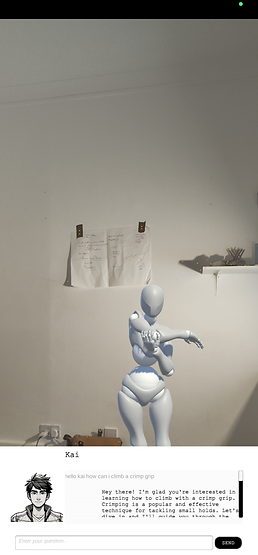top of page
top
Embodied AI Climbing Assistant
Programs Used: Unity, ChatGPT, Figma

an Embodied AI AR Companion tailored to support climbers throughout their journey. From mastering grip techniques to advancing in skill, to aiding outdoor climbers in identifying routes and climbs, including emergency situations by swiftly identifying safe routes.
It's a comprehensive solution designed to enhance climbing experiences while prioritizing safety and skill development.
Kai Climbing Companion
Kai Climbing Companion UI Interface
Who is Kai?
Identity: Kai is a virtual embodiment of a climbing instructor, with an agile and athletic form, designed to interact with climbers via an AR interface on their smartphones.
Appearance: Kai has a humanoid form, which allows for a relatable and engaging interaction, making climbers feel like they are being guided by a human coach.
Function: Kai’s primary role is to assist climbers by offering insights into climbing techniques, providing tips for progression, and offering solutions to problems climbers face on the wall.
Use cases
the users of Kai, the Embodied AI climbing companion, are individuals with a passion for climbing who come from various skill levels and have diverse goals.
Need for Progression: Many climbers hit plateaus or struggle to push past their fear of difficult moves. Kai is there to help climbers overcome these hurdles.
Accessibility to Knowledge: Kai brings expert knowledge to the fingertips of climbers at any location, at any time.



AI Decision Flow Tree and Storyboard
The AI Decision Tree Analysis explores and highlights the decision-making across diverse scenarios, serving to inform the AI decision-making process, while also enabling tailored responses to meet the diverse needs of users.

Kai Embodied AI Storyboard
The storyboard illustrates how various users engage with the AI, Kai, as they navigate different scenarios to achieve their goals. It captures the diverse support levels attained through distinct decision-making processes, showcasing the range of interactions and outcomes.
Kai Early Version
Application and User Interface V1
Early version looked at importing a model with animations to bring it to life and integrate chatgpt model built on climbing to bring Kai to life.
Drawbacks:
In the initial stages, the user interface was employed to prototype and validate the concept’s functionality. Nevertheless, it encountered problems, such as; incorrect plane placements, Red character design with no movement. UI did not align with the intended style and the text conversation progress remained at a very basic level.
Elements to be reconsidered :
-
Character design
-
User interface Colors
-
messaging layout
placing character in space using place on plane script within the space.
Chatgpt Early version test



Chatgpt Early UI Development
Character and Early testing
Place one plane script development using visual scripting


Kai AR-Further development
Character Design - Inspiration
The Concept
Pixar effectively connects non-human characters to human audiences by giving them emotional depth and distinct human-like features. These features include unique facial characteristics and expressive emotions. This approach fosters a stronger emotional bond between the audience and the characters, while always acknowledging their nonhuman nature.
How it Applies
By employing similar techniques, we can make Kai the AR companion more relatable without forgetting his non- human essence. This approach enables users to establish a bond with Kai while maintaining the understanding that he cannot replace humans on a psychological level

Kai AR-Further Development
Character Design - Making Kai More Human

Developed KAI AI model
Early model developed using CSM AI
Updated KAI AR Companion
A more approachable companion that is approachable friendly and encouraging, humanoid human who is sleek and agile fantastical yet grounded in reality.
Kai AR-Further development
UI- messaging layout - Inspiration
The Concept
While character design in Japanese games serves as a rich source of inspiration, the methods employed for conversation design are particularly impactful. These methods not only exhibit a unique artistic style but are also recognized for their text-intensive nature while still bieng unique.

How it Applies
Utilizing a similar user interaction approach with Kai has the potential to transform the climbing experience into a more immersive and relatable one. By integrating gamification elements, climbers can engage with Kai in a way that makes the activity feel like a game. This not only enhances the overall experience but also encourages users to stay motivated leading to a more enjoyable and effective climbing session.
The Colours
Utilizing a similar user interaction approach with Kai has the potential to transform the climbing experience into a more immersive and relatable one. By integrating gamification elements, climbers can engage with Kai in a way that makes the activity feel like a game. This not only enhances the overall experience but also encourages users to stay motivated leading to a more enjoyable and effective climbing session.

AI Flow and Storyboard
Introduction
Early Development
Character design Development
UI Design Development
Final Design Development
Kai AR-The Final Design
The final design strives to closely showcases Kai in monotone colors while maintaining a user-friendly, simple, and highly effective UI, particularly when contrasting with the colored heavy walls of bouldering gyms. In the pursuit of an enhanced overall design, distinct fonts are employed to differentiate between the user and Kai. This approach ensures clear identification without resorting to chat colors that might detract from the overall aesthetic
Moving Forward
Moving forward the Kai AR companion model will be equipped to showcase various climbing grips, and we will enhance accessibility for users by incorporating audio communication features.



Explore other Digital Creations
bottom of page






